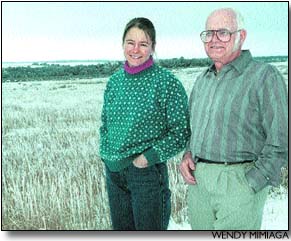|
January 1, 2002
By Janelle Holden With a stroke of the pen, 560 acres of canyons and historic farmland were preserved in Dolores County on New Year’s Eve Day. The Montezuma Land Conservancy helped landowners Max and Ada Dicken, and adjacent landowner Blaine Reed, complete separate conservation easements on their properties six miles southwest of Dove Creek. The easements are the first completed in Dolores County for the conservancy, a local non-profit organization that helps landowners with voluntary land conservation. Co-director Nina Williams hopes that others in Dolores County will also realize the benefits of preserving property. "If landowners are interested in protecting their property for future agricultural use and in limiting the development rights for it, then a conservation easement could be a tool for that," said Williams.
The Dickens, long-time residents of Dove Creek and retired teachers, said they didn’t want to see their 320 acres of open space eventually turn into "ranchettes." The Dickens’ easement allows 240 acres of tillable land to be used for agriculture, and the rest of the property will be left as open space and canyons. Most of the farms around the Dickens’ were homesteaded, but this property wasn’t farmed until Max Dickens’ father purchased it in 1940. "It’s just a little world all by itself. My dad loved that place, and he knew I did too, so he willed it to me," explained Max. Max said the farm had historically been used as a sheep camp before it was farmed. Right now the 240 acres the couple used to raise dryland beans, wheat, and hay on are enrolled in the U.S. Department of Agriculture’s Conservation Reserve Program. The property is home to numerous kinds of wildlife, including bald eagles, deer, foxes, rabbits, and many other animals. The couple said they’ve seen mountain lions, and 30 years ago, a lynx, on the property. The tillable land is bordered on three sides by canyons, two unnamed, and one called Monument Canyon. Currently there are no dwellings or buildings on the property, but Max and Ada are allowing one homesite in the easement. "That place is a beautiful farm, and I don’t want to divide it up into ranchettes," said Max. Williams explained that although there are some significant financial benefits to conservation easements, landowners must realize they are making a donation. "It’s important to know that they are giving something up, that whatever kind of financial benefit or good feeling they get from doing the right thing, they are still giving up the right to develop that property," said Williams. But Max hopes others in the area will consider the benefits of easements when they consider what they want their property to look like in the future. "This is an excellent way to protect our rural way of life," said Max, who said that was his motive in doing a conservation easement. "We love this open-space country. There’s room enough here." Reed’s 240-acre tract, which is adjacent to the Dickens’ property on its north edge, protects the agricultural value of a small parcel of tillable land, wildlife habitat in the canyons, and open space. Williams said the three canyons on Reed’s property are much deeper and wilder than the neighboring Dickens’, and only a small part of the property is tillable. "To have Mr. Reed’s happen at the end of the year too is exciting because it makes the easement a bigger piece of land." Reed, who is from Delta, was not available for comment on Monday. Both easements are held by the La Plata Open Space Conservancy, but the Montezuma Land Conservancy is required to monitor the property annually to make sure the conditions of the easements are being met. |
||||
|
Copyright © 2001 the Cortez Journal.
All rights reserved. |
